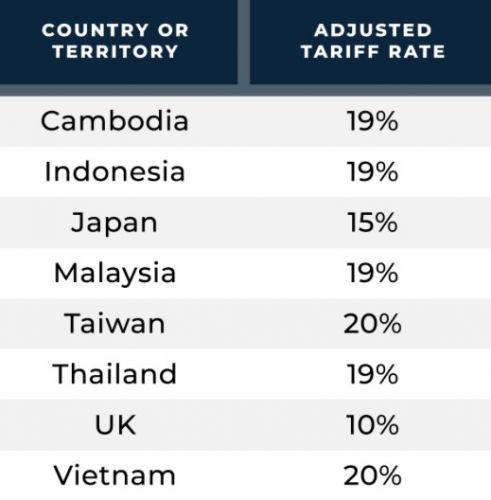WASHINGTON (BRAIN) — New tariffs affecting nearly every U.S. trade partner were announced by the White House hours before the Friday "reciprocal" tariff deadline, including major bike supplying nations. The tariffs will take place Aug. 7, with the exception of Canada.
Countries that the U.S. has a trade surplus with will have a flat 10% tariff rate on their products imported by the U.S. For the approximately 40 nations that have a trade deficit with the U.S., a baseline 15% tariff will be applied. The new tariff plan replaces the "reciprocal" tariffs that were announced in April.
Tariffs of 35% on Canada began Friday, the first major trading partner to see immediate changes. The White House said goods compliant with the U.S.-Mexico-Canada Agreement would not be subject to the higher rate, which would lessen the impact.
Adjusted tariff rates affecting bike-producing countries include Taiwan (20%), Vietnam (20%), Cambodia (19%), and Malaysia (19%). A senior Trump administration official said 26 of the deficit countries will face tariffs higher than the new 15% minimum, citing what the White House described as "excessive" trade imbalances.
"While the full impact of these new tariffs is still unfolding, it's clear that they could significantly affect costs across the bicycle industry supply chain," said Matt Moore, PeopleForBikes general and policy counsel. "We are closely monitoring both the legal challenges and implementation process and will continue advocating for outcomes that protect our members, support the industry's growth, and minimize disruption for businesses and consumers."
The reciprocal rate on Taiwan imports was 10%, down from the 32% rate announced in April. A 32% rate was set to take effect Friday. Also in April, Trump announced a 49% reciprocal tariff on Cambodia, a major supplier of bikes and e-bikes to the U.S. This was later reduced to 36% and delayed until Friday. Products from Malaysia, another supplier of bikes and components, was to be subject to a 24% tariff effective Friday.
The legality of the tariffs is to be determined. President Trump has invoked the International Emergency Economic Powers Act to justify them, but the Court of International Trade previously ruled the move exceeded presidential authority. On Thursday, oral arguments began in the administration's appeal. A final ruling could take months, and any decision may ultimately be reviewed by the Supreme Court.
Last week, a preliminary trade deal with the European Union and the U.S. would set tariffs on European products at levels not seen since before the Great Depression. But the 15% tariff announced last weekend was a reduction from the 30% that the Trump administration had been threatening.


